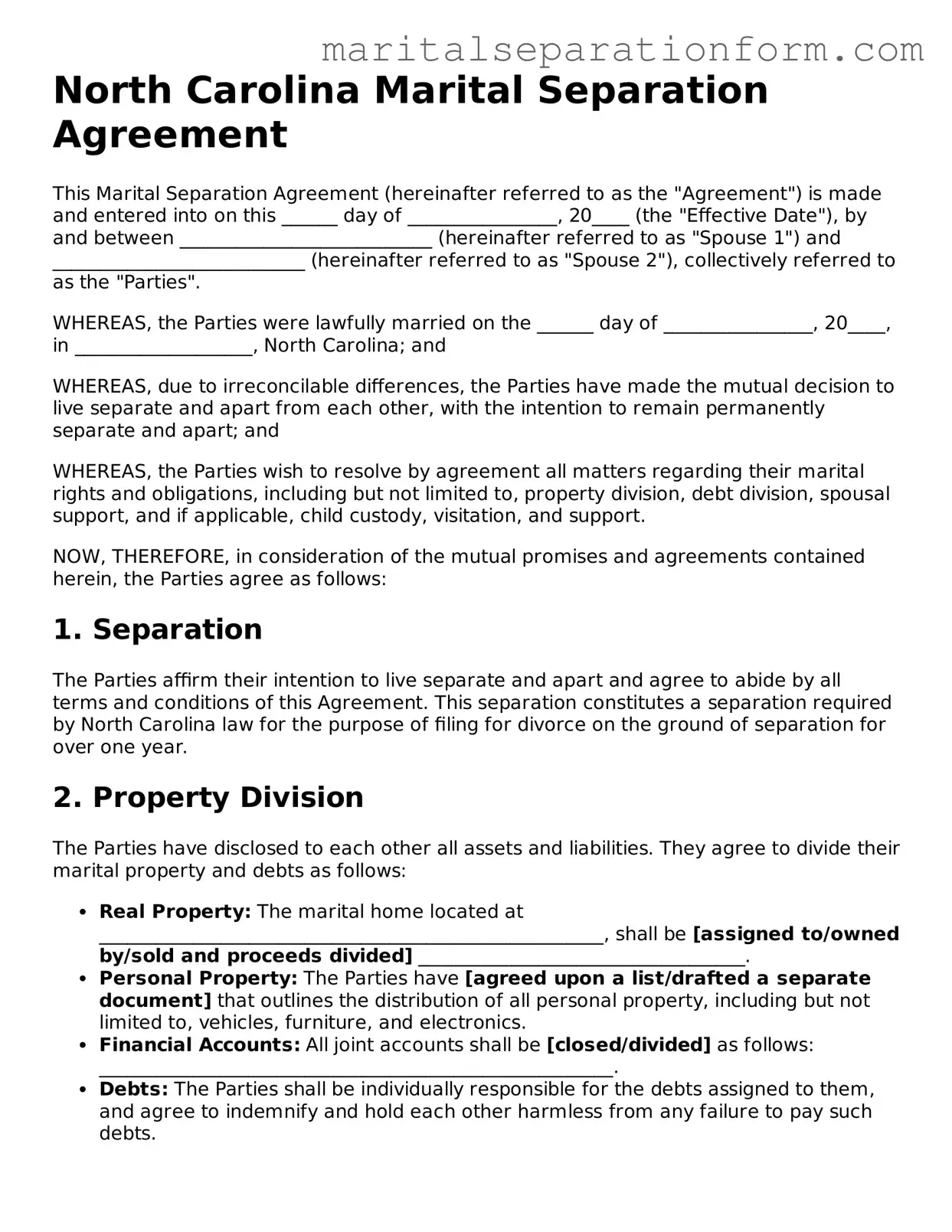North Carolina Marital Separation Agreement
This Marital Separation Agreement (hereinafter referred to as the "Agreement") is made and entered into on this ______ day of ________________, 20____ (the "Effective Date"), by and between ___________________________ (hereinafter referred to as "Spouse 1") and ___________________________ (hereinafter referred to as "Spouse 2"), collectively referred to as the "Parties".
WHEREAS, the Parties were lawfully married on the ______ day of ________________, 20____, in ___________________, North Carolina; and
WHEREAS, due to irreconcilable differences, the Parties have made the mutual decision to live separate and apart from each other, with the intention to remain permanently separate and apart; and
WHEREAS, the Parties wish to resolve by agreement all matters regarding their marital rights and obligations, including but not limited to, property division, debt division, spousal support, and if applicable, child custody, visitation, and support.
NOW, THEREFORE, in consideration of the mutual promises and agreements contained herein, the Parties agree as follows:
1. Separation
The Parties affirm their intention to live separate and apart and agree to abide by all terms and conditions of this Agreement. This separation constitutes a separation required by North Carolina law for the purpose of filing for divorce on the ground of separation for over one year.
2. Property Division
The Parties have disclosed to each other all assets and liabilities. They agree to divide their marital property and debts as follows:
- Real Property: The marital home located at ______________________________________________________, shall be [assigned to/owned by/sold and proceeds divided] ___________________________________.
- Personal Property: The Parties have [agreed upon a list/drafted a separate document] that outlines the distribution of all personal property, including but not limited to, vehicles, furniture, and electronics.
- Financial Accounts: All joint accounts shall be [closed/divided] as follows: _______________________________________________________.
- Debts: The Parties shall be individually responsible for the debts assigned to them, and agree to indemnify and hold each other harmless from any failure to pay such debts.
3. Spousal Support
Following a careful consideration of the financial status of the Parties, [Spouse 1/Spouse 2] shall pay to [Spouse 1/Spouse 2], the sum of $__________ per month as spousal support for a period of [specify period].
4. Child Custody, Visitation, and Support
If applicable, the Parties have agreed on the following arrangements for their child(ren):
- Custody: _______________________________________________________________.
- Visitation: ____________________________________________________________.
- Support: A separate child support agreement has been [prepared/agreed upon] and is attached hereto as Exhibit A.
5. Dispute Resolution
Any disputes arising under or in connection with this Agreement shall be subject to mediation, before resorting to legal proceedings.
6. Governing Law
This Agreement shall be governed by and construed in accordance with the laws of the State of North Carolina.
7. Entire Agreement
This Agreement, including any attachments or exhibits referenced herein, constitutes the entire agreement between the Parties concerning the subject matter hereof and supersedes all previous agreements or understandings, whether written or oral.
8. Amendment and Waiver
No amendment, change, or modification of any of the terms, provisions, or conditions of this Agreement shall be effective unless made in writing and signed by both Parties. The waiver by either Party of a breach of any provision of this Agreement shall not operate as or be construed to be a waiver of any subsequent breach.
9. Signatures
IN WITNESS WHEREOF, the Parties have executed this Agreement as of the Effective Date first above written.
___________________________ ___________________________
Spouse 1 Signature Spouse 2 Signature
___________________________ ___________________________
Print Name Spouse 1 Print Name Spouse 2
___________________________
Date

